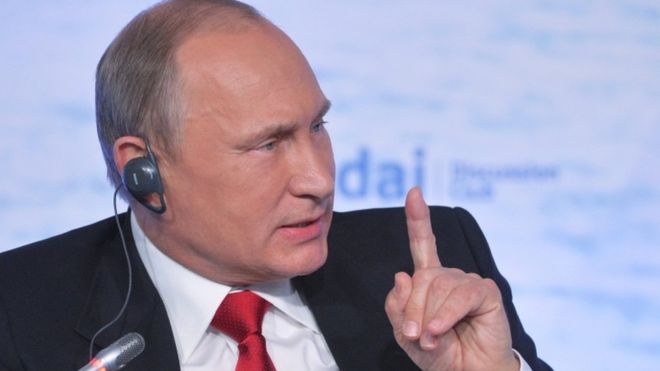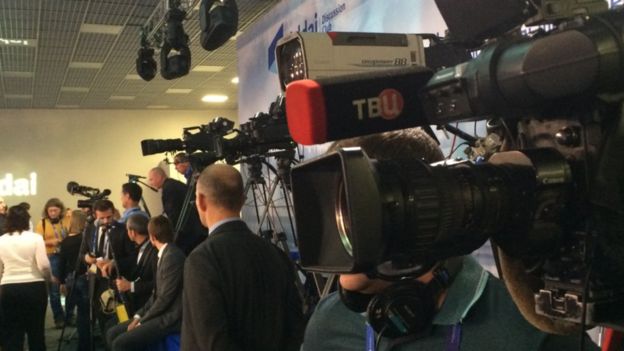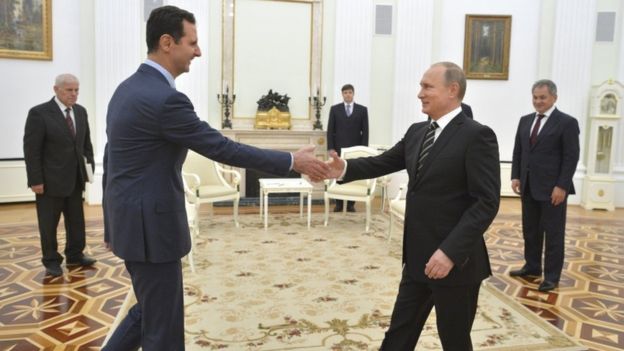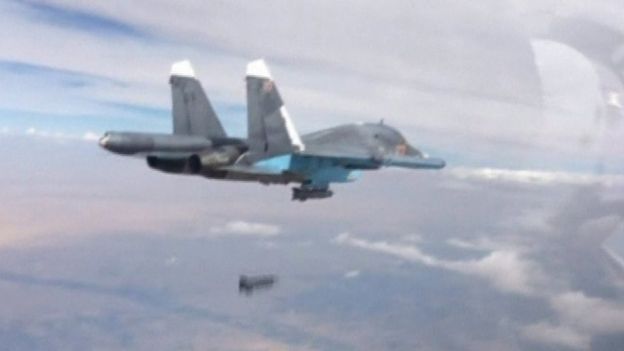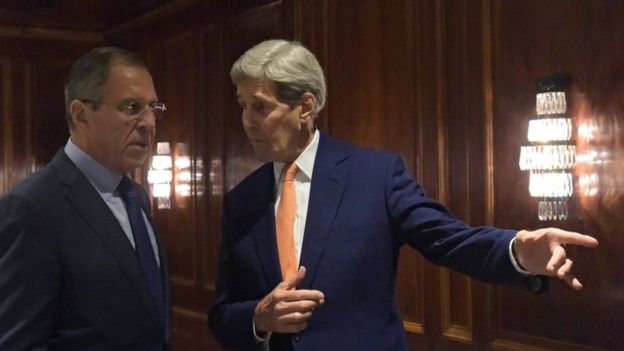Syria poses challenges for Putin
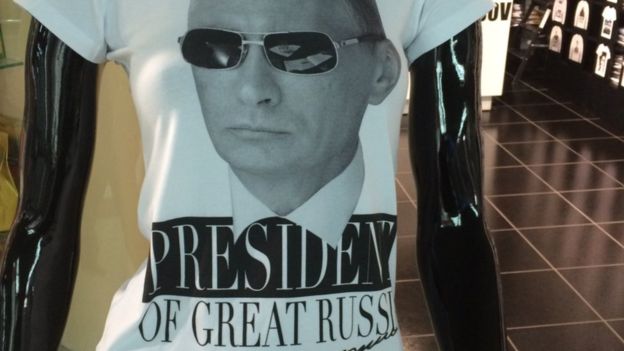
In the mountains above Sochi in southern Russia, the marble halls and panoramic terraces of the Krasnaya Polyana hotel were almost empty.
Built for a G8 summit in 2014 that was called off because of the Ukraine crisis, and still weeks away from this winter's ski season, the resort had the look of an extravagant white elephant.
But for the Russian government it is a useful backdrop for occasions like the annual Valdai meeting where President Vladimir Putin and other top Russian officials can showcase their views in exchanges with foreign scholars.
This year the conversation was dominated by Syria and Russia's intentions there.
First and foremost, President Putin and other top Kremlin officials insisted that military victory in Syria was not Russia's real objective.
There had to be a parallel diplomatic track to push for a grand settlement, involving global players like Russia and the US, neighbours like Iran and Saudi Arabia, and — as Russian Foreign Minister Sergei Lavrov put it — "a full spectrum of the opposition".
And that is where the first puzzle in Russia's Syria policy lies.
Exactly which opposition movements does Russia want to crush militarily and which does it want to include in talks?
President Putin told us that Russia's aim was to "liberate Syria from terrorists" and stop jihadists from the Islamic State group (IS) from taking over Damascus and then the entire country.
IS extremists and al-Qaeda-linked al-Nusra fighters, then, were the main enemy — but also "all other terrorist groups".
In his Valdai speech President Putin at first seemed to dismiss all opposition forces hostile to the government of President Bashar-al-Assad.
He said there was no difference between "moderate" and "non-moderate" terrorists, and accused the US and its allies of playing a dangerous double game, bombing some groups and arming others.
Yet when it comes to US-backed fighters in the Free Syrian Army (FSA), Russia's position does seem to be shifting.
"Let me raise the curtain on my talks with President Assad," said Mr Putin, revealing that he had asked for and got (who knows how grudgingly?) acceptance from the Syrian leader to explore the idea of helping those armed opposition groups who were genuinely prepared to fight IS.
Later Mr Lavrov fleshed out the plan. Moscow was ready to offer air support to the "patriotic opposition" in Syria, including the FSA- although he added that so far the US was refusing to provide details of the rebels' positions.
It is hardly surprising that Washington and FSA commanders have been ambivalent or downright dismissive of Moscow's change of heart.
After all, until now they believe that Russian planes, far from protecting them, have been selecting targets to take their fighters and bases out.
The second puzzle in Russia's Syria gambit is its relationship with the US.
For any Russian grand strategy to work — liberating Syria from IS, and re-activating meaningful peace talks — Moscow needs to win round the US and its allies, especially those in the Middle East.
Mr Putin acknowledges that.
"To liberate Syria we need to unite forces," he said, adding that Syria could become a new model of post Cold War collaboration.
Yet he and his officials continue to score points off the Obama administration over Syria wherever they can.
"The situation had become intolerable, we had to intervene," said one senior Kremlin official, claiming that where 18 months of US-led coalition strikes against IS had failed to dent it, already Russia's air force was making a difference.
"We're more effective," he said. "Our cruise missiles have worked well too."
So is this initiative a serious attempt to engage the US in a joint enterprise to solve the war in Syria?
Or is it Russia seizing the opportunity to boost its profile at America's expense — showcasing its military hardware for good measure?
The third puzzle is how risky this Syrian adventure could prove for Russia, if it does not go to plan.
The main danger must be domestic security — the threat from returning jihadist recruits who might launch terror attacks in Russia.
Mr Putin estimated that about 4,000 recruits from Russia and other former Soviet republics had gone off to fight for IS.
Another leading Russian expert on the Middle East told us the real figure was probably more than 6,000.
One member of the Kremlin elite said the worry was not just a possible re-emergence of terror groups in Russia's unruly and impoverished North Caucasus.
Extremist cells had already been identified in the Volga and Ural regions, in Moscow and St Petersburg.
"The problem is everywhere," he said.
And most alarming of all was the prospect of IS jihadists arriving from Afghanistan.
The official said his biggest concern was the Tajik-Afghan border where Taliban and al-Qaeda forces were already launching attacks.
Certainly the threat of domestic terrorism helps Mr Putin explain why getting involved in a messy war in a Muslim Arab country far away is in Russia's national security interest.
But it also raises the spectre of a backlash, a return to the horrifying terror sieges of the early 2000s.
If the Syria intervention provokes rather than prevents home-grown terrorism in Russia, Mr Putin risks bearing part of the blame.
Perhaps less obvious is another domestic risk for Russia — the danger of being cast as an ally of Shia forces (Iran, Shia militias from Iraq, Shia Hezbollah fighters from Lebanon and Assad's own Allawite supporters) against Syria's largely Sunni opposition.
This is clearly a subject of acute sensitivity.
"We are not fighting Sunnis in Syria. We are fighting terrorists," said one Kremlin official sharply.
Another official put it more bluntly: "Our Muslims are all Sunni, so Russia doesn't want to quarrel with the Sunni world."
Another argument for Russia to make such efforts to try to win over the Sunni governments of Turkey, Saudi Arabia and other Gulf states and now to reach out to the FSA too.
But perhaps the biggest puzzle is how Russia hopes to mount a limited campaign — in time and space — which avoids Russian casualties, yet fulfil such ambitious aims.
The air strikes would be time-limited, officials told us — some have suggested three to four months, some six months — but not open-ended.
And it seems the campaign will be strictly limited to Syria, however much the Iraqi government would like Russia to bomb IS there too.
Yet President Putin says that success cannot be partial — Syria partitioned and President Assad only in control of a rump state. Instead the Syrian state must be restored to its original borders.
It is hard to see how that objective is realistic, if Russia intends to withdraw its air cover after six months.
If plan A works, then Russia will be able to say it offered the global leadership that allowed a grand peace settlement for Syria to get off the ground.
And if it does not, there will be plenty of others to blame for the failure.
But perhaps the other answer to many of these conundrums is that Russia's dramatic intervention is only partly thought through.
"You think it was planned long in advance. But sometimes we have to react spontaneously and quickly. It was a reaction to events," said one member of the Kremlin elite.
Mr Putin gave another explanation: "One thing I learnt 50 years ago on the streets of Leningrad was that if a fight is inevitable, you need to land the first punch," he said pithily, offering a startlingly personal rationale for his Syria strategy.
Perhaps it also gave an important hint about his own psychology — that any tendency on his part to act unpredictably and aggressively may in part derive from the gut survival instincts of a schoolboy street fighter.
Политика конфиденциальности | Правила пользования сайтом
